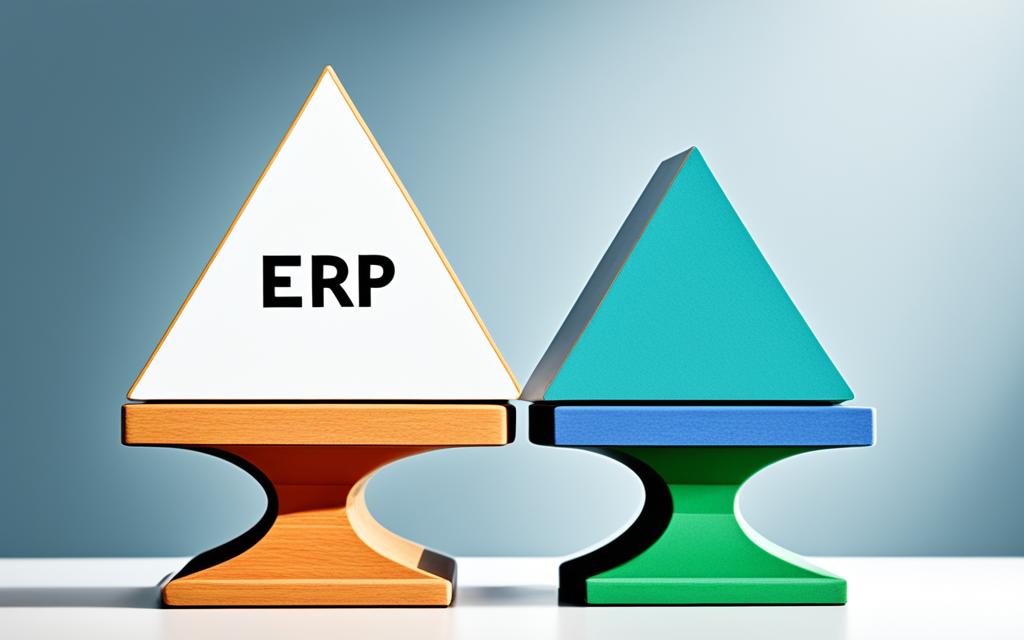Did you know the global ERP software market might hit $96.04 billion by 2027? It shows how critical ERP software is in ecommerce for optimizing business management. In the bustling ecommerce world, ERP solutions stand out for their role in enhancing business growth. By adopting ERP systems, businesses are finding innovative ways to manage inventory and process orders accurately. They also protect customer data. Let’s dive into how ERP solutions are changing the ecommerce world. We’ll see how Sage ERP software streamlines e-commerce operations, enhances efficiency, and supports growth by integrating inventory, order management, and CRM.
Key Takeaways
- Understanding the expanding ERP software market and its significance in ecommerce.
- Exploring how ERP software is essential for the intricate fabric of online business management.
- Identifying the capabilities of ERP systems that can unlock a business’s full potential.
- Analyzing the benefits offered by Sage ERP software for ecommerce businesses.
- Determining how ERP can maximize operational efficiency and improve the customer experience.
- Recognizing the importance of ERP software in optimizing omnichannel strategies.
- Gaining insights into choosing the right ERP solution for enhancing ecommerce flexibility.
Understanding the Role of ERP in Ecommerce Growth
The growth of online shopping calls for advanced systems to manage businesses. Ecommerce and ERP systems work closely together. This teamwork is vital for smooth operations and planning ahead.
The Surge of Ecommerce and ERP Interdependency
As more businesses move online, integrating ERP with ecommerce has become essential. This mix is no longer just nice to have—it’s crucial for success. With growth, using ERP to automate ecommerce is a must.
Key Functions of ERP Systems in Online Businesses
ERP affects all parts of online operations. It updates inventory in real-time and ensures orders are filled smoothly. This not only makes customers happy but also improves how resources are used.
Automating Ecommerce with ERP for Enhanced Efficiency
Using ERP to automate ecommerce cuts down on manual mistakes. It serves as a foundation for quick, smart decisions. This way, businesses can adjust quickly to new trends and what customers want.
Strategic Advantages in Automation and Data Analysis
ERP systems give businesses a clear view of important data that used to be hard to see. By combining sales, finance, and customer data, ERP becomes a key tool for making strategic plans.
| ERP Function | Benefits to Ecommerce | Strategic Outcome |
|---|---|---|
| Inventory Management | Accurate stock levels in real-time | Reduced holding costs and improved cash flow |
| Order Processing | Streamlined fulfillment | Increased customer satisfaction |
| Financial Reporting | Consolidated view of financials | Informed budgeting and financial planning |
| Customer Relationship Management | Tailored customer engagement | Higher retention rates and lifetime value |
Innovative Ecommerce Strategies with Sage ERP Software for Ecommerce
As an ecommerce entrepreneur, using Sage ERP software for ecommerce has changed my business. It offers amazing solutions and strategies. It handles my business with great precision and flexibility.
The power of Sage ERP lies in its ability to keep inventory matched with sales data. This means I never have too much or too little stock. Adding payment and shipping integrations has made my operations smoother. This boosts the reliability of my online store. Sage ERP helps me quickly adapt to market changes, too.
By centralizing data across numerous channels, Sage ERP software for ecommerce gives my business a significant edge, providing my customers with a cohesive brand experience regardless of where they shop.
Using Sage ERP software has truly differentiated my business. Here’s an overview of its features and their benefits for my ecommerce operations:
| Feature | Benefit for Ecommerce | Real-World Application |
|---|---|---|
| Inventory Management | Accurate stock levels in real-time | Prevents overselling during peak seasons by monitoring stock pith |
| Order Processing | Automated order fulfillment | Speeds up delivery by connecting orders directly to distribution |
| Financial Reporting | Insightful financial analytics | Drives strategic decisions with performance metrics and profitability analysis |
| Customer Relationship Management | Enhanced customer insights | Personalizes marketing efforts based on customer behavior and history |
This approach has made my operations better and boosted customer happiness. This is key to my business’s success.
Sage ERP software’s flexible approach to ecommerce management keeps impressing me. It encourages me to try new strategies. With it, I feel confident in my ecommerce journey.
Types of ERP Models: Which One Suits Your Ecommerce Business?
Finding the right ERP system is key to my ecommerce business’s success. It ensures flexibility and efficiency. Deciding on an ERP system can feel overwhelming. But learning about each model helps me find the best technology. Each ecommerce business needs a system that fits its unique needs.

Generalist ERP Systems: Pros and Cons
Generalist ERP systems are like a Swiss Army knife for business. They handle many tasks without needing extra customization. This is good for businesses that want simple solutions. But they might lack special features for ecommerce.
Modular vs. Suite ERP Solutions
Modular ERP solutions and suite ERP solutions are very different. Modular systems let me choose what I need for my business. This can mean a better fit. Suite solutions provide many tools in one package. This might be too much for a small ecommerce business.
Deciding on the Best Fit for Ecommerce Flexibility
It’s time to choose the model that offers the most ecommerce flexibility. This choice is more than picking an ERP. It’s about the future of my business. I need to think: Do modular solutions’ custom options outweigh generalist systems? Or is a suite solution’s complete package better? I must carefully examine my business needs to ensure the system grows with my ecommerce goals.
Maximizing Online Storefront Success Through ERP Integration
Exploring ERP integration reveals its importance for online shops. Today’s ecommerce world needs flexible and strong integration plans. We’ll look at changes towards cloud solutions and the importance of on-premise and hybrid models in ecommerce strategies.
Migrating to a Cloud-based ERP Environment
Cloud-based ERP systems offer scalability and global operation freedom. This flexibility is crucial for my online shop’s success in ecommerce. The cloud marks a future with real-time data and insights at its core.

Switching to a cloud system proved its value for staying competitive. It gives me advanced analytics and lets me follow market trends closely. This made my online store better at meeting customer needs, boosting satisfaction and profits.
On-Premise vs. Hybrid ERP Solutions
Choosing between on-premise and hybrid ERP solutions is a big decision for business owners. On-premise solutions offer full control and can be more secure, making them good for businesses wanting to manage systems in-house. Hybrid ERP solutions combine cloud flexibility and on-premise reliability.
When planning my ecommerce strategy, I compared both models’ advantages and disadvantages. Should I go for on-premise solutions for more control, or choose hybrid systems for their flexibility? Every business faces these choices based on their needs and what their customers expect.
Aligning Your Ecommerce Strategy with the Right Integration Model
To boost online stores, aligning strategy with the right ERP integration model is key. Choosing cloud-based or hybrid models should match the overall ecommerce strategy. This ensures smooth operations and a good customer experience.
Choosing the best ERP model has improved my stock management, order processing, and payments. More importantly, it enhanced customer experiences, crucial in today’s ecommerce world.
The focus of ERP integration in my online shop is on enabling growth, innovation, and meeting customer needs. By carefully choosing and using cloud, on-premise, or hybrid ERP systems, businesses can achieve great online success.
Key Features of ERP That Propel Ecommerce Businesses Forward
When looking into the key features of ERP in ecommerce, it’s clear they do more than support the back office. They are essential for making ecommerce businesses more successful and efficient, boosting customer happiness. For example, ERP software capabilities act like the brain of an online shop. They smoothly manage many tasks at once.
Managing finances well is critical for any ecommerce company that wants to be careful with money and make a profit. ERPs help businesses keep their expenses in check, provide up-to-date financial reports, and make choices based on data. This makes ERP for online business success key to managing and predicting financial well-being.
CRM features are also very important. In today’s world, giving customers personalized experiences is key. ERP tools help businesses create strong bonds with customers. They track customer interactions, likes, and what they buy. This leads to marketing that feels personal and improves customer loyalty and keeping them coming back.
Inventory management tools are vital yet often overlooked in the world of ecommerce. ERP systems give businesses precise control over inventory. This ensures they have just the right amount of stock. Paying attention to inventory is crucial for keeping customers happy.
- Streamlined Inventory Restocking
- Accurate Demand Forecasting
- Reduced Carrying Costs
Linking with shipping services is another point we need to talk about. By making shipping automatic and centralized, ERPs help online stores send out orders faster, offer different shipping choices, and handle returns better. All these are key to a great shopping experience online.
Lastly, Product Information Management (PIM) is vital for keeping product details consistent across all online channels. This helps create a uniform and engaging shopping experience.
To wrap up, the blend of advanced ERP features not only drives an ecommerce business ahead but also gives it the tools needed to deal with online retail’s challenges. With these features, businesses can stay ahead of the game and succeed in the digital world.
ERP and Multichannel Ecommerce Strategy: A Comprehensive Approach
In the world of multichannel ecommerce, a good ERP system is essential. It makes online shopping smoother and better for everyone. With ERP, businesses can handle their operations more easily and improve how they interact with customers on different platforms. This is how ERP helps businesses and customers in multichannel ecommerce.
Centralizing Data for Cross-Platform Sales Consistency
Having a strong ERP in multichannel ecommerce means consistency across all sales channels. A solid ERP gathers all channel data in one place. This helps keep the inventory, pricing, and product details accurate. Customers get a reliable shopping experience, on a phone app or an online marketplace.
Managing Omnichannel Sales with a Unified ERP System
Using a unified ERP system for omnichannel sales ensures everything works in harmony. It lets businesses control orders, logistics, and customer info from one dashboard. This simplifies things and speeds up decision-making.
Leveraging ERP for Enhanced Customer Experience Across All Channels
The main aim of ERP in ecommerce channel management is to improve customer experience. An ERP solution covers every part of the customer journey. From marketing to after-sales, it ensures a smooth and personalized experience regardless of the channel.
| Feature | Benefits |
|---|---|
| Real-time Inventory Updates | Reduces the likelihood of stockouts and backorders, ensuring customers have access to desired products, no matter the channel. |
| Customer Data Analysis | Enables tailored marketing efforts and personalized shopping experiences leading to increased customer loyalty. |
| Automated Order Processing | Improves the efficiency of the order fulfilment process and reduces the risk of human error. |
| Integrated Financials | Provides a holistic view of financial performance across all channels, aiding in strategic fiscal planning. |
By adopting a complete ERP system, businesses improve operationally and enhance their ecommerce platforms. ERP software links all aspects of online retail, creating a united brand presence. This leads to an enhanced customer experience at every step.
Conclusion
In my journey through the ecommerce world, I’ve learned a lot about ERP software. These systems are key for running an ecommerce business successfully. They help companies work better and make customers happy. ERP software, like Sage ERP, lets businesses perfect their online shops, keep track of inventory, follow orders, and give excellent customer service.
The future of ERP in online businesses is bright. New technologies are making ERP systems even more powerful. By choosing the right ERP and integrating it well with their online shops, companies can stand out in the competitive ecommerce market. ERP comes with many tools, from managing money to handling customer relationships. These tools help businesses run smoothly and grow in the future.
I’ve seen first-hand the huge benefits ERP systems bring to ecommerce. The future will bring challenges and chances to grow. With ERP as our ally, we can move forward in the digital world with confidence. So, thinking about ERP is not just about listing its benefits. It’s about preparing for an ever-changing ecommerce environment. Companies using ERP are set to succeed in the exciting future.

